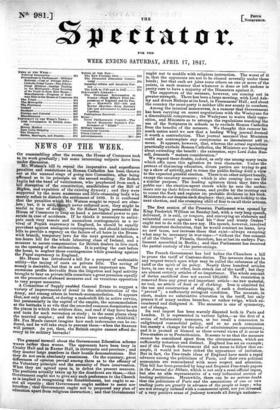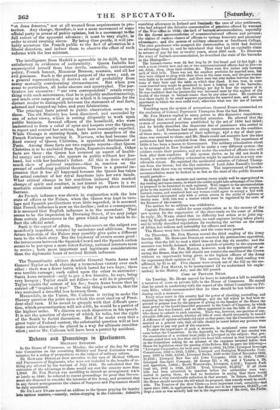The French Government has laid before the Chambers a bill
to prune the tariff of Customs-duties. The measure does not in any respect trench upon what may be called the substance of the tariff or the spirit of its policy. Nearly three hundred articles have in one way or other, been struck out of the tariff ; but they are almost entirely articles of no importance. The whole amount of duties sacrificed does not exceed 120,0001. No restriction is removed from any great and important article—no raw material, no tool, no article of food or of clothing. Iron is admitted for the use and construction of shipping, if such a destination be " proved "; a sufficiently stringent condition. The measure, in short, makes no substantive alteration in the tariff, but only prunes it of many useless branches, or rather twigs, which en- cumbered and disfigured it. The measure is one of symmetry, not of change.
Its real import has been warmly disputed both in Paris and London. It is represented in various lights,—as the first of a series of reformatory measures, as too small a concession to enlightened commercial policy, and as no such concession but merely a change for the sake of administrative convenience; and it is praised or blamed as these several views of it occur to Free-traders or to Protectionists. It seems to us that the measure cannot be considered apart from the circumstances, which are sufficiently notorious and distinct. England has set an example; and if the French Government did not mean to follow that ex- ample, it would not have risked the appearance of imitation. But in fact, the Free-trade ideas of England have made a rapid advance among the politicians of Paris, and their own political economists are remembered with more respect and attention. This bill has been preceded by long and frequent Free-trade papers in the Journal tics Debats, which is not only a semi-official organ, but also an able representative of a very influential section of leading politicians. Meanwhile, there can be no serious doubt that the politicians of Paris and the associations of one or two trading ports are greatly in advance of the people at large; who- are not strongly imbued with a commercial spirit, nor yet divested of a very positive sense of jealousy towards all foreign nations-- " et done ferentes," nor at all weaned from acquiescence in pro- tection. Any change, therefore, is not a mess movement of some official party in arrear of public opinion, but ias movement to the full extent of the apparent advance : it must be very slight, in order to avoid creating alarm. By being thus gentle, it will pro- bably accustom the French public to the fact of alteration ni liberal direction, and induce them to observe the effect of such reforms with the less mistrust.



























